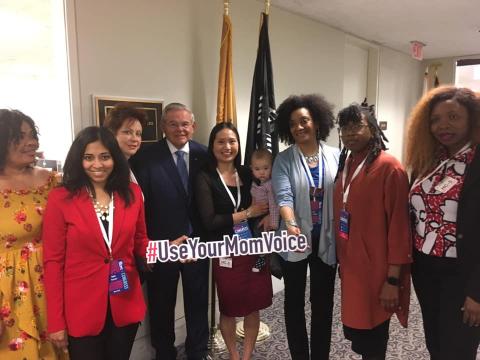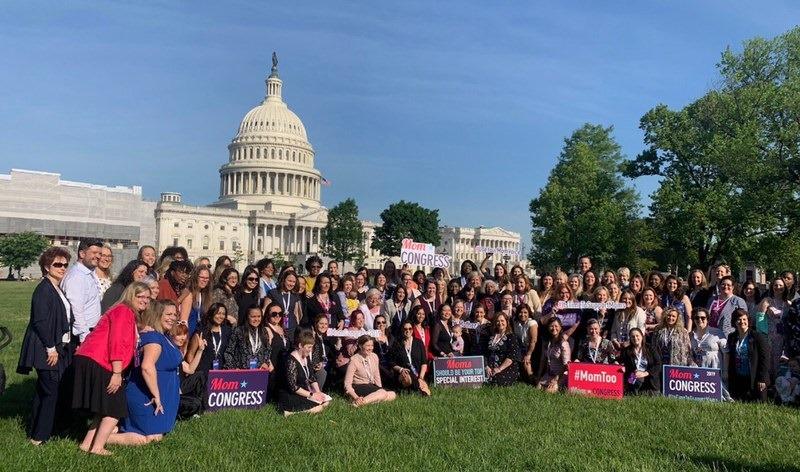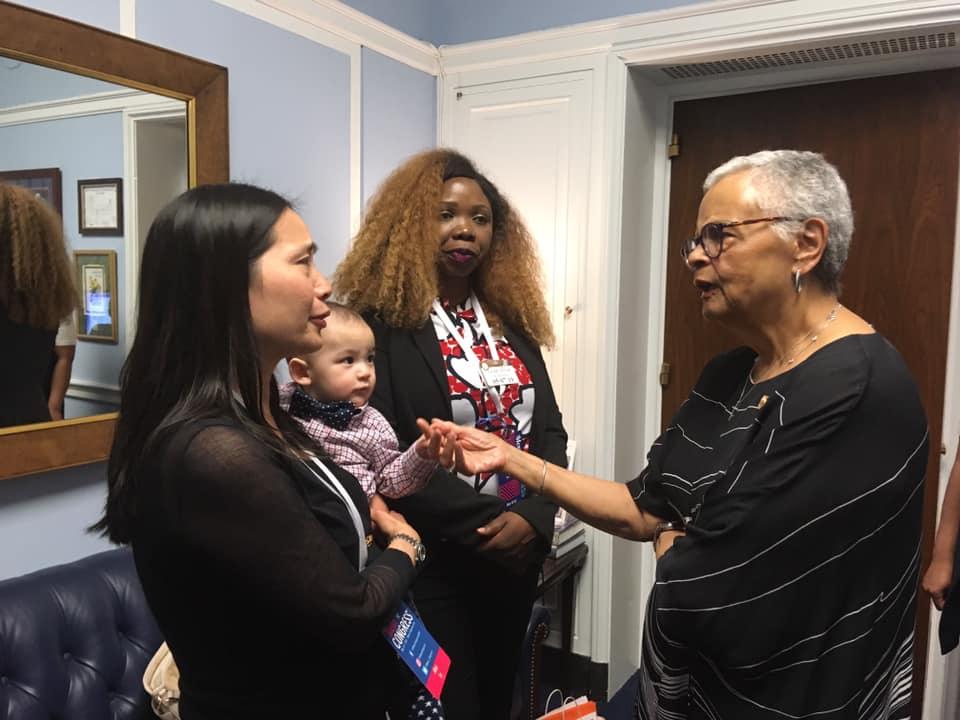
Moms, activists and advocates meeting with the office of NJ Senator Bob Menendez to talk about supporting maternal health
Standing Up for Maternal Health at Mom Congress 2019
The United States has the worst maternal death rates of any developed country, with Black women dying at 3-4 times the rates of white women, this rate remains unchanged when accounting for income, education and economic status. Maternal death rates for women overall in the U.S. doubled in the past 25 years, meaning that women today have a higher risk of dying at childbirth than their mothers, and the disparities that Black women face have been around for decades. For every maternal death in the country, 70 women face a life-threatening and too often, life-altering complication.
Of these complications, the most common one is maternal depression, which is a leading cause of maternal death. Up to 50% of women living in poverty will suffer from maternal mental health disorder. Black women face an even greater burden when it comes to maternal depression due to the toxic stress of racism and intergenerational trauma.
This is why it is SO IMPORTANT for our decisionmakers to hear directly from moms and from loved ones who have lost the ones they love to our national maternity crisis. The statistics are shocking, but numbers alone don't paint a complete picture of what happens when a mother is lost, numbers don't illustrate the impact on a child who will grow up forever without their mom, nor the impact on family, friends, and their community. The loss of a mom is not contained, it ripples onward forever for those who love them.
Love, loss, support, and prevention were at the heart of Mom Congress, a three-day event from May 5-7, 2019 that brought together moms, and those who love and support them to talk with government leaders about what matters most in maternal and child health. The three days consisted of advocacy training, honing storytelling skills and breakout caucuses to discuss topics such as Black Maternal Health, in smaller, more intimate groups. I presented a "Taking Advocacy Home" session with Chanel Porchia-Albert, the Founder and Executive Director of Ancient Song Doula Services, where Chanel shared the importance of advocating from a place of self-love that extends to the community and beyond, as well as her work advocating for policies in NYC and in NY state, including standing up for the economic sustainabilities of doulas of color as they provide care in NY. I shared information of the many ways MomsRising engages our members to make a difference, not only in the policy realm but in their communities, either through one click petitions, deliveries of stories and factsheets to their electeds or getting engaged with our #KeepMarching circles and calls. The day closed with a conversation between the Founder of Every Mother Counts, Christy Turlington Burns, and NJ First Lady Tammy Murphy. First Lady Murphy spoke about her #NurtureNJ Campaign, an awareness campaign that seeks to reduce the state’s high maternal and infant mortality rates and eliminate racial disparities in health care, and also spoke on efforts being undertaken within the state to address these issues with the goal of one day making "New Jersey the safest state to give birth in".
The following day was an advocacy day on the Hill, where I led a group of women from my home state of NJ to champion a "Momnibus" agenda that included bills to improve maternal health, address maternal mental health and enable diaper access for low-income women.
The most powerful part of the day was when moms bravely shared their personal stories to make a difference in these issues. I spent the day with three remarkable women, all moms whose experiences highlighted the need to prioritize maternal health. One of the moms in our group, Nancy, tragically lost her daughter, Alexis Joy D’Achille to postpartum depression 5 weeks after giving birth. Alexis and her husband had gone to seven different providers to get the proper help for her depression and were tragically unsuccessful as they found themselves being bounced back and forth between providers. The loss of Alexis also illustrated the troubling lack of accurate data when it comes to deaths caused by postpartum depression. Both Alexis's mother and husband (who also spoke at the conference and advocated) pointed out that Alexis's death certificate gave no indication that she had given birth recently. The certificate stated her cause of death as suicide but did not capture the actual underlying cause of postpartum depression. This illustrates the greater issue of maternal deaths being vastly undercounted, with there being a lack of resources needed to support moms due to inadequate or incomplete data.
Another mom in our group, who brought along her adorable baby to advocate with her, also suffered through severe postpartum. She shared a similar experience of being bounced back and forth between providers and going for 7 months without the treatment she needed. Her story touched the hearts of many office staffers, but a highlight of the day was when she told her story directly to Representative Bonnie Watson Coleman, who met with us despite us not have a scheduled appointment with her office. Congresswoman Watson-Coleman even offered up a private room in her office so the mother could breastfeed, further demonstrating how having moms in Congress makes a difference!
Lily, the founder of KWITU, Kenyan Women In the United States, was part of our NJ contingent and shared the important perspectives and experiences of African immigrant women, who face barriers of racial disparities, language access, and lack of culturally competent services. Lily spoke of her own efforts to support women in her community around maternal health but pointed to the need for implicit bias training for healthcare providers so they can deliver the quality of care needed by moms of color and immigrant moms.
The stories shared highlighted the reality of disparities that many moms face in our country. Many of these experiences happened to women who were college educated, had access to resources and support yet still suffered gaps in care. If these breakdowns in care happened to those with resources, what does it mean for moms who face barriers such as racial and economic disparities?
We still have a long way to go, but the passing of recent federal maternal health legislation, the Preventing Maternal Deaths Act this past December offer some encouragement, as do state-level efforts, such as the signing of four maternal health bills in New Jersey by Governor Phil Murphy. Legislation is very important, but it is one of the many solutions needed to address our nation's maternal health crisis. We must prioritize the issues that impact women before they become moms and continue prioritizing their voices and needs before, during and after birth.
I am grateful to have had the opportunity through Mom Congress to advocate with my fellow moms and activists on this crucial issue, especially during the week leading up to Mother's Day. Sadly, every Mother's Day, more and more loved ones are mourning the moms who didn't survive childbirth. This is unacceptable, we can and must do better.





The views and opinions expressed in this post are those of the author(s) and do not necessarily reflect those of MomsRising.org.
MomsRising.org strongly encourages our readers to post comments in response to blog posts. We value diversity of opinions and perspectives. Our goals for this space are to be educational, thought-provoking, and respectful. So we actively moderate comments and we reserve the right to edit or remove comments that undermine these goals. Thanks!